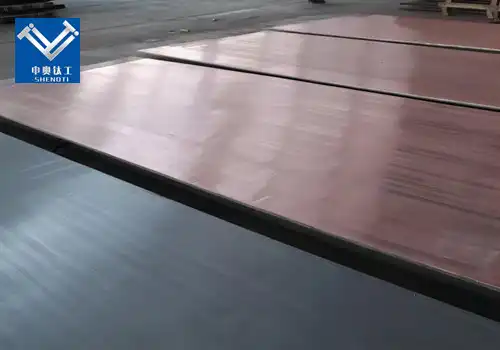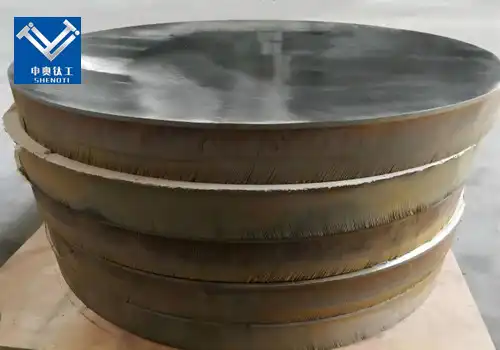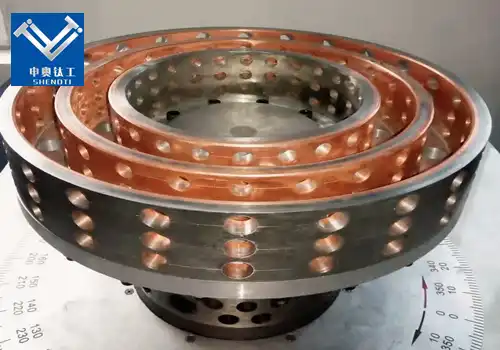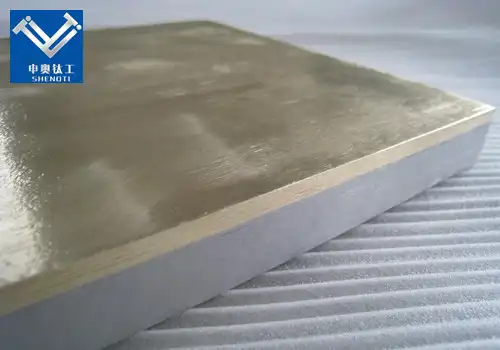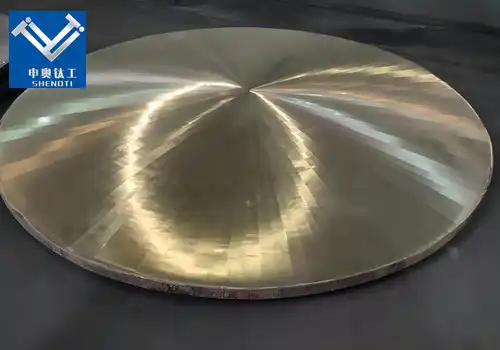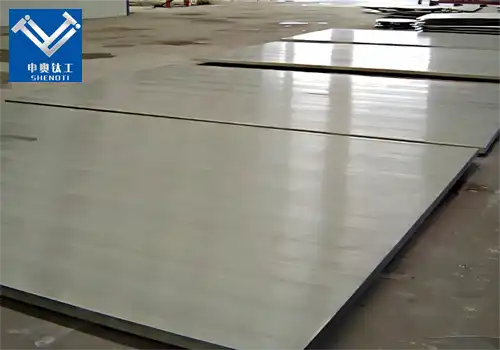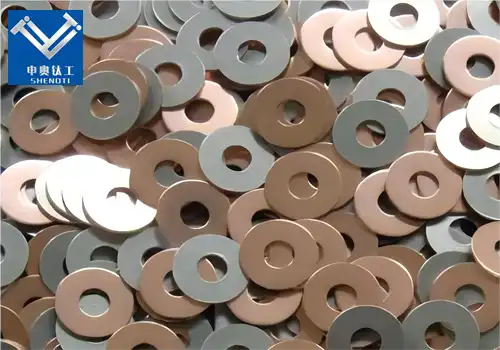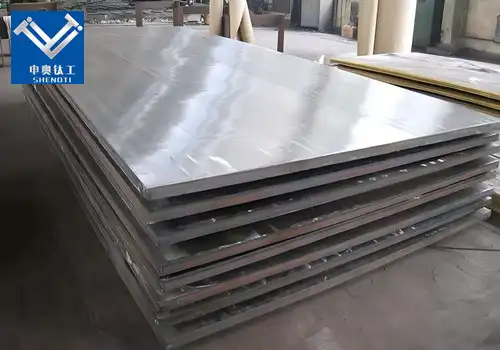
How Is Titanium Stainless Steel Clad Plate Manufactured?
2025-07-10 16:26:59
What Is a Titanium Stainless Steel Clad Plate?
A Titanium stainless steel clad plate is a bimetallic composite plate produced by bonding a layer of titanium onto stainless steel through explosion bonding, hot rolling, or diffusion welding. The result is a cost-effective material that offers the mechanical integrity of stainless steel and the corrosion resistance of titanium.
Key Features of Titanium Stainless Steel Clad Plate
Excellent corrosion resistance in acidic and chloride-rich environments
High mechanical strength and pressure resistance
Cost-effective alternative to solid titanium plates
Good weldability and machinability
Durable bond interface with strong metallurgical adhesion
The Titanium stainless steel clad plate is often used in heat exchangers, pressure vessels, desalination plants, and petrochemical equipment where pure titanium would be prohibitively expensive.
How Is Titanium Stainless Steel Clad Plate Manufactured?
1: Explosion Bonding Technology
One of the most commonly used techniques is explosion bonding, which uses a controlled explosion to forcefully bond titanium and stainless steel under high pressure. The result is a metallurgical bond without melting the base materials.
Advantage: Minimal thermal impact, preserving material properties
Bond quality: Strong, uniform, and defect-free
Enhanced Material Lifecycle
The corrosion resistance of titanium translates to longer equipment life, fewer replacements, and lower maintenance.
Example: Heat exchangers clad with titanium have up to 10x longer service life in acidic environments compared to stainless steel alone.
Lightweight with High Strength
Despite its lightness, the titanium layer adds substantial resistance to corrosion and fatigue, while the stainless steel base provides mechanical strength, enabling a versatile material for harsh industrial conditions.
Application: Suitable for thick and large-dimension clad plates
2: Hot Rolling Cladding
In this method, titanium and stainless steel plates are joined and passed through high-temperature rollers, forming a metallurgical bond through heat and pressure.
Advantage: Smooth interface, scalable production
Application: Mass production with thinner plate requirements
Applications of Titanium Stainless Steel Clad Plate
1: Chemical Processing Industry
Titanium’s resistance to acid corrosion makes the clad plate suitable for reactors, condensers, evaporators, and acid storage tanks.
Environments: Hydrochloric acid, nitric acid, sulfuric acid
Advantage: Extended equipment life and lower maintenance costs
2: Marine Engineering and Desalination
Titanium stainless steel clad plates are widely used in seawater desalination and marine components due to their excellent saltwater corrosion resistance.
Applications: Seawater heat exchangers, piping, evaporators
Benefits: Minimized corrosion, lower total ownership cost
3: Power and Energy Sector
In nuclear and thermal power plants, clad plates are used in steam generators, condensers, and cooling systems.
Why titanium? High temperature resistance and inertness to aggressive cooling media
Why stainless steel? High strength and cost control
4: Aerospace and Defense
Lightweight, corrosion-resistant Titanium stainless steel clad plates are ideal for aerospace skins, structural components, and military vessels.
Advantages: Weight reduction, corrosion immunity, high structural integrity
4: Medical and Pharmaceutical Equipment
Due to titanium's biocompatibility and hygiene standards, Titanium stainless steel clad plates are increasingly used in sterilizers, mixing tanks, and chemical reactors.
Benefits of Using Titanium Stainless Steel Clad Plate
Cost Savings Without Compromising Quality
One of the biggest advantages of Titanium stainless steel clad plate is its ability to significantly reduce material costs while preserving performance.
Titanium layer: Thin, corrosion-resistant skin
Stainless steel core: Economical, high-strength support
This structure makes it possible to use expensive titanium only where needed while maintaining overall structural performance.
Industry Standards and Certifications
When choosing a Titanium stainless steel clad plate, it’s essential to ensure compliance with international standards, such as:
ASTM B898 – Specification for explosive bonded clad plates
ASME SB-265 – Titanium and titanium alloy plate
ISO 9001 / ISO 14001 – Quality and environmental management systems
PED 2014/68/EU – Pressure Equipment Directive compliance
Reliable manufacturers will provide material certificates, ultrasonic testing reports, and bonding strength inspection results for every shipment.
How to Choose the Right Titanium Stainless Steel Clad Plate?
1: Consider the Application Environment
Different industries demand different grades. For example:
Gr2 titanium + 316L stainless steel is perfect for strong acid environments
Gr1 titanium + 304 stainless steel suits general anti-corrosion use
2: Check for Bonding Quality
Ask for ultrasonic inspection or shear strength test data to ensure the metallurgical bond is free from voids or delamination.
3: Evaluate Supplier Experience
A supplier experienced in explosion bonding or hot rolling can guarantee consistent product quality and timely delivery.
Global Demand and Market Trends
The global market for Titanium stainless steel clad plate is growing rapidly due to increased investments in:
Desalination infrastructure
Chemical and pharmaceutical equipment upgrades
Nuclear and renewable energy projects
Asia-Pacific, especially China and India, is a major market due to expanding infrastructure, while Europe and the Middle East lead in advanced engineering applications.
Why Choose Titanium Stainless Steel Clad Plate?
The Titanium stainless steel clad plate represents the perfect fusion of performance and value. By combining the best of titanium and stainless steel, this bimetallic solution meets the rigorous demands of corrosive, high-pressure, and high-temperature environments — without exceeding budget constraints.
Whether you're in chemical processing, desalination, energy, or aerospace, investing in Titanium stainless steel clad plate ensures operational efficiency, safety, and long-term savings.
Contact Us
Baoji City ShenAo Metal Materials Co., Ltd.
Experts in titanium, stainless steel, and clad plate solutions for global industries.
📍 Location: Hi-tech Industrial Development Zone, Baoji, China
📧 Email: zh@baojiti.com.cn
🌐 Website: shenaocladplate.com
We offer custom production, technical consultation, and international shipping. Get in touch to request a quote or free sample of our Titanium stainless steel clad plate.
YOU MAY LIKE











